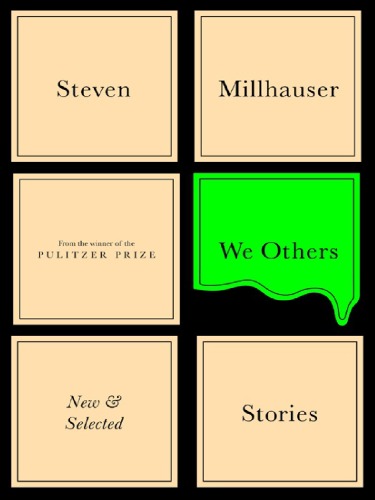
We Others
New & Selected Stories
کتاب های مرتبط
- اطلاعات
- نقد و بررسی
- دیدگاه کاربران
نقد و بررسی

June 27, 2011
Millhauser's latest (after Dangerous Laughter), seven new stories and 14 taken from four previous collections, is an excellent primer for casual fans of the Pulitzer Prizeâwinning author, whose dreamy tales of Old World phantoms, All-American menace, and childhood mysteries reveal that some obsessions last a lifetime. However, Millhauser followers may be frustrated by the organizing principle: stories were selected that "seized my attention as if they'd been written by someone whose work I had never seen before," the author states. Yet there is a particular pleasure in seeing a new story, like "Tales of Darkness and the Unknown," remix the mood of adolescent longing mined 13 years ago in "Clare De Lune," or in recognizing the summertime idyll of the new "Getting Closer" in "A Protest Against the Sun," first published in 1981. "The Slap" and "The Next Thing," both new, are obvious critiques of modern life, but a deeper reading illuminates a lasting obsession with our need to impart meaning to the meaningless. New work shows the author eschewing the creaky wonder of classics like "August Eschenberg," but achieving an icy perfection with his prose. A conundrum, then: a gift for newcomers and a likely disappointment for fans, as it is neither a complete "collected works" nor a fresh collection. But diehards who want to trace the author's artistic development over a third of a century will be thrilled.

July 15, 2011
Literary fiction old and new from one of the contemporary masters of the form.
Much of this collection has been selected from previous works, including stories from The Knife Thrower (1998) and The Barnum Museum (1990). Settings range from the contemporary to the indefinite to the historic. "A Protest Against the Sun" is modern enough to feature a character in Goth-like dress and a teenage protagonist so introspective and sophisticated as to seem coequal to her parents. Conversely, "Eisenheim the Illusionist" is set "when the Empire of the Hapsburgs was nearing the end of its long dissolution." Millhauser's latest work opens the book. In the first new story, "The Slap," readers enter a bucolic suburban community where a nameless man has begun to slap people at random. Clad in a bland trench coat, the man may be striking out against self-absorption and self-satisfaction, or he simply may be unstable. He slaps. And then he stops. Readers are left to dream why. The second new story is "The White Glove": Emily and Will, teenage partners in a deep platonic but not yet romantic relationship, are confronted by an odd disease that ends with Emily covering her hand with a white glove. Like much of Millhauser's work, "The White Glove" touches upon the surrealistic and resonates with metaphors and allegories. A shorter piece is "Getting Closer," six pages of exposition delving into a youngster's reluctance to end the sweet anticipation of summer's beginning. "The Invasion from Outer Space" offers near science fiction without robots and dying planets. "People of the Book" is a religious allegory complete with a virgin birth. Meanwhile, "The Next Thing" imagines a faceless corporation that builds a giant underground warehouse store—alluring and mysterious, a bizarre Sam's Club submerged—only to take over the town above for its own executives.
Literary language, more introspection than action, much exposition, intelligent speculation about the human condition, all woven through sophisticated storytelling.
(COPYRIGHT (2011) KIRKUS REVIEWS/NIELSEN BUSINESS MEDIA, INC. ALL RIGHTS RESERVED.)

March 15, 2011
Selected stories ranging across three decades plus new works like the novella-length title story; a good mix for anyone who wants to get acquainted (or reacquainted) with Pulitzer Prize winner Millhauser. For literate readers everywhere.
Copyright 2011 Library Journal, LLC Used with permission.

August 1, 2011
This offering from the Pulitzer Prizewinner for the novel Martin Dressler (1996) collects 7 new and 14 previously published short stories, spanning three decades. The inventiveness and intelligence of Millhauser's writing has been well noted and, for the most part, the new works don't disappoint. In stately, almost formal prose that belies playfulness, often writing as we (or even as an I that reads more like a we), Millhauser explores the anxiety of a Long Island commuter town (The Slap); a 9-year-old's quiet existential crisis (Getting Closer); a teenager's unbearable curiosity about a friend's secret (The White Glove). In the best of the lot, the dreamlike The Next Thing, consumer society is presented as a colonizing force as townsfolk mortgage their futures to a many-tentacled retail operation. Unfortunately, The Invasion from Outer Space is a mere sketch, and People of the Book a one-note joke that doesn't land. But at his best, Millhauser juxtaposes suburban idyll and anxiety in probing examinations of the human condition. Any library that takes short fiction seriously should have this.(Reprinted with permission of Booklist, copyright 2011, American Library Association.)

























دیدگاه کاربران